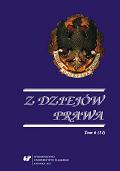Zakaz reformationis in peius w wojskowym postępowaniu karnym okresu międzywojennego
The reformationis in peius ban in a military criminal proceeding in the interwar period
Author(s): Tomasz SzczygiełSubject(s): Law, Constitution, Jurisprudence
Published by: Wydawnictwo Uniwersytetu Śląskiego
Summary/Abstract: The law of appealing judicatures already constituted a grounded and unquestionable value of the military criminal trial in the first quarter of the 20th century. What was important from the point of view of an accused was a guarantee of the ban of judicature in the second of an accused in the second instance. The Polish Army, restoring after 1918, needed regulations regulating the criminal proceeding. For obvious reasons, there was no possibility to use native regulations of the prepartition period. What they decided on was using regulations of partitioned nations, namely a German and Austrian act of a military criminal proceeding. Each of these acts guaranteed the right to submit the means of appealing defined by its regulations referring to the Roman maxim Reformatio in peius iudici appellato non licet. A radical change of opinions took place in line with the army code of the criminal proceeding from 1936 that replaced foreign solutions. It included going away from the guarantee of the reformationis in peius ban, in favour of the possibility to judicature in the revision instance irrespective of a direction of appeal. It was the result of the criticism of the appealing system functioning in the common jurisdiction. Also, a revision of so far existing views on the usefulness of a criminal repression and punishment dimension took place. A new criminal procedure was undoubtedly influenced by a doctrine of a total nation that faced a favourable legislative basis. The necessity to follow the so called military reasons in a criminal proceeding derived from a new basic act from 1935.
Journal: Z Dziejów Prawa
- Issue Year: 14/2013
- Issue No: 6
- Page Range: 127-150
- Page Count: 24
- Language: Polish

